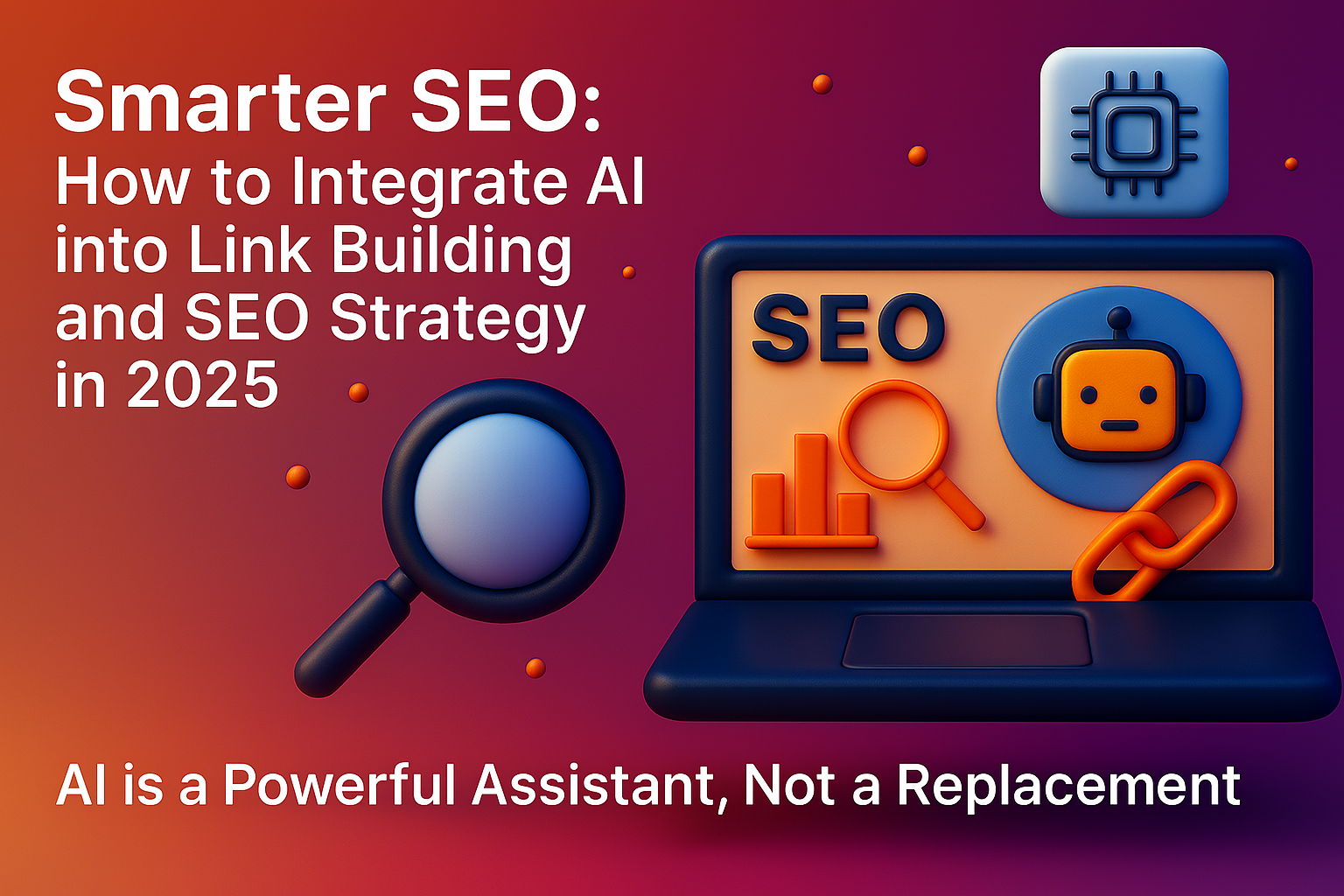Search engine optimization is no longer what it used to be. With constant algorithm updates, changing user behavior, and growing content demands, SEO now requires more than manual effort. One of the most practical evolutions is the integration of artificial intelligence. When used thoughtfully, AI in SEO and AI in link building can streamline efforts, uncover new opportunities, and improve outcomes across the board.
This article will walk through how to effectively integrate AI into link building and SEO strategy, with actionable tips for marketers, SEO professionals, and agencies.
What AI Brings to SEO and Link Building
AI Is a Powerful Assistant, Not a Replacement
AI is not here to take over SEO. Instead, it serves as a tool that supports data analysis, automation, and scale. For SEO and link building, AI helps in areas like:
- Keyword research
- Content planning
- Competitor analysis
- Backlink prospecting
- Outreach personalization
- SEO auditing
Instead of spending hours digging through data or manually checking backlink profiles, AI tools can process this information in minutes and help users focus on decision-making.
Enhancing Keyword Research with AI
Smarter, Faster Keyword Discovery
Traditional keyword research involves tools like Google Keyword Planner or manual SERP review. Now, AI-powered platforms can analyze search behavior, understand context, and offer clusters of related keywords based on actual user intent.
Examples of AI-enhanced keyword tools:
- Surfer SEO: Suggests keyword clusters for entire content strategies
- Frase: Helps group related terms and question-based queries
- ChatGPT: Can be prompted to generate long-tail keyword ideas based on seed terms
This makes planning easier, especially when dealing with large websites or multiple target niches.
Using AI to Create SEO-Optimized Content
More Than Auto-Writing
AI in SEO content doesn’t mean letting a tool write an entire article without review. It means using AI to assist in planning, structuring, and improving content so that it aligns better with search engine expectations.
AI tools can help:
- Generate SEO-friendly outlines
- Analyze top-ranking competitors
- Suggest keyword placements
- Provide internal linking ideas
Platforms like Jasper, MarketMuse, and Clearscope allow SEO professionals to focus on editing and optimizing rather than writing everything from scratch.
Improving On-Page SEO with AI
Fixing Technical Gaps and Suggestions
AI-powered tools can scan websites and provide suggestions related to on-page SEO. They can identify missing tags, content gaps, slow-loading elements, and more.
Some useful tools:
- Surfer SEO: Offers real-time optimization suggestions
- Screaming Frog (combined with AI models): Analyzes site structure efficiently
- NeuronWriter: Helps align content with NLP scoring for SEO improvement
These tools reduce the chances of missing simple but impactful on-page issues.
AI in Link Building: Automating with Intent
Streamlining Prospecting and Outreach
AI in link building is extremely useful for saving time. Manually finding backlink opportunities can be slow and inefficient. AI tools can scan the web for relevant websites, analyze their authority, and suggest personalized outreach messages.
For example:
- AI can identify guest posting targets based on niche relevance and domain metrics
- Natural Language Processing (NLP) helps analyze whether a site is editorial or promotional
- AI-assisted tools like Pitchbox and Respona can draft custom outreach emails using existing data
AI doesn’t replace the strategy—it supports it by filtering the best prospects and helping scale outreach campaigns.
Analyzing Backlink Quality with AI
Beyond acquiring backlinks, it’s essential to assess their value. AI tools use a combination of domain authority, traffic metrics, anchor usage, and link placement to evaluate each backlink’s impact.
This helps teams avoid spammy sites and focus on backlinks that actually influence search rankings.
Competitive Analysis Powered by AI
Reverse Engineering What Works
AI can help you analyze your competitors’ content, backlink sources, keyword gaps, and overall visibility trends.
Tools like:
- Ahrefs (enhanced with AI summaries)
- SEMrush (now offering AI-driven reports)
- SpyFu
These platforms allow you to learn from successful websites and adjust your own strategy accordingly.
Tracking SEO and Link Building ROI with AI
Data-Driven Decisions Without the Guesswork
After implementation, the next step is evaluation. AI tools provide data dashboards that show traffic trends, keyword movements, high DA backlink acquisition, and user engagement, all in real time.
Some tools even forecast how your rankings might improve based on current link building trends.
Looker Studio, Google Analytics (enhanced with AI insights), and SEO dashboards powered by GA4 + AI integrations allow clear visibility into performance.
Balancing AI with Human Strategy
Know Where AI Helps—and Where It Doesn’t
Although AI in SEO and AI in link building can save time and offer insights, certain parts of the process require human involvement:
- Relationship building in link outreach
- Writing high-trust content
- Strategy development
- Interpreting nuanced analytics
Use AI to handle repetitive tasks and data analysis, while keeping creativity and decision-making human-led.
Future Trends: Where AI in SEO Is Headed
Integration with Search Experiences
AI is now becoming part of search engines themselves—such as Google’s Search Generative Experience (SGE). This means your SEO strategy must adapt for longer, more conversational queries and deeper content experiences.
Link building, too, will evolve. Contextual relevance and authority will remain central, but AI may start influencing link patterns and topic authority in even more advanced ways.
Conclusion
Integrating AI into link building and SEO strategy is not about replacing the old methods, but improving how they work. AI enhances research, automates tasks, and provides insights that lead to better rankings, traffic, and visibility.
Whether you’re running a small business or an SEO agency, using AI smartly allows you to scale efforts while staying focused on the outcomes that matter most.


